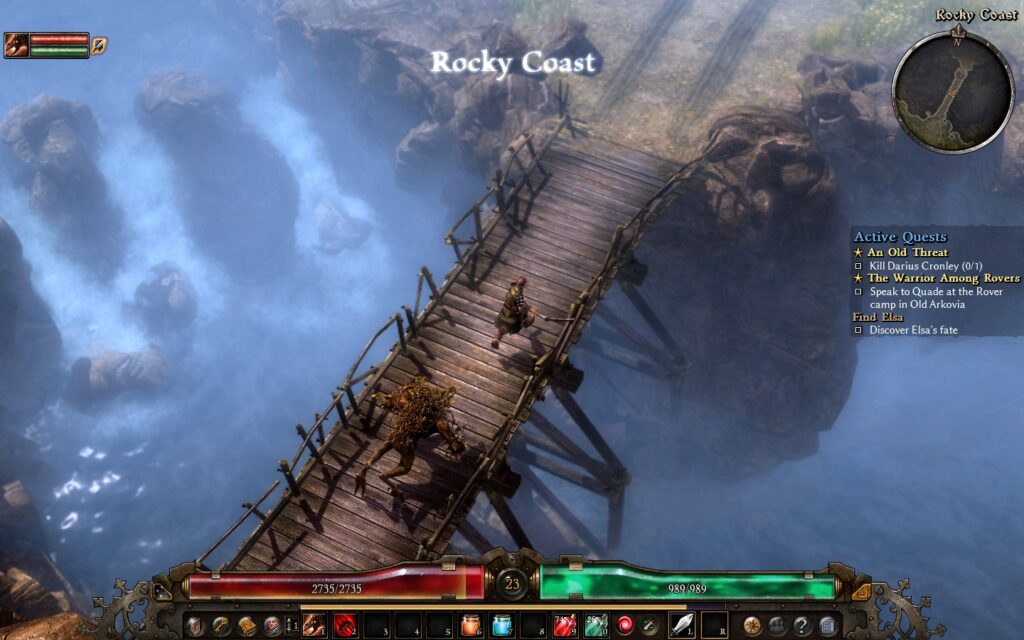
During the Steam Summer Sale my brother introduced me to the 2016 action RPG Grim Dawn. If you’re not familiar, it’s an iteration of the classic Diablo formula and more specifically, Diablo II. Like this game’s inspiration, there are a number of classes that you can choose from, referred to in this game as “masteries.” However, unlike its inspiration, you don’t choose your mastery until you reach level 2 (which admittedly doesn’t take long). Furthermore, as you advance in level, you don’t automatically also become higher level in your chosen mastery. Instead, you earn a number of advancement points that you can choose to invest into higher levels of your mastery, increasing your base stats and unlocking higher level skills and abilities that you can also put points into as you build out your character.
Additionally, once you hit level 10, you unlock the ability to add a second mastery to your character, making a more powerful multiclass combination that follows the same advancement rules. And finally, the game also includes another path of progression called “divinities” that are earned through engaging with the game by locating and interacting with shrines scattered throughout the game world. These points are spent to unlock various nodes on an incredibly expansive list of constellations that are gated behind previous choices that provide further increases to character abilities and even new skills.

All in all, there’s a lot going on behind the scenes with this game that is going to keep me engaged with it for a long time as I plumb its various depths. And more importantly, it got me thinking about the concept of progression in tabletop RPGs and how various games handle it in some very broad strokes.
No or Limited Progression
Often found in games that are heavily story driven or in games where the characters are defined more by what they do instead of what they can do, this type of game is also very prevalent in the realm of superhero roleplaying. At the extreme end, there are games like Risus that offer no type of progression or advancement beyond what meaning the players find themselves and take away. Less extreme examples may allow for minor updates to characters – updating a skill here and there or swapping points in existing characteristics to reflect how the recent narrative changed the character. Big character defining changes can and do happen, but they are often the culmination of major story arcs or events that fundamentally change who that character is. Games like this include FATE, 7th Sea 2nd Edition, and any number of different games within the superhero genre like Sentinel Comics Roleplaying or Wild Talents.
Prescribed Advancement
This is your “classic” type of level advancement that is found in any number of games, especially those that draw their inspiration from any edition of Dungeons and Dragons. In games like this, your character follows a set path of progression as they engage with the story and make their way in the world. Some of these games, especially older versions of Dungeons and Dragons and many of the retro-clones on the market provide very little room to break away from the mold and make a character mechanically unique, relying instead on a player’s initial choices and how they choose to portray them at the table to do that with advancement simply making them better at the thing their class does.
Other games provide a host of different advancement options to make different types of builds that may reinforce certain things about the class or let them play against type in certain ways. Games that highlight this are 5th Edition Dungeons and Dragons’ and Pathfinder’s systems of class archetypes or Star Wars Saga Edition’s vast number of talent and feat choices for characters to pick and choose from. Finally Numenera and Monte Cook’s other offerings within the Cypher System provide a lot of ways to build unique characters within a framework of different character classes.
Freeform Advancement
At the opposite end of the spectrum, you have games that offer “open” systems of character advancement. Whether this looks like Savage Worlds where characters gain advancements that can be spent on a number of different edges or skill and ability enhancements or a game like GURPS where you simply gain more points to spend on a vast list of skills and talents for whatever setting the GM has curated for their particular game, these games rely less on “traditional” elements like class structures or build options to let you develop and build a truly unique character that fits your own unique vision, and lets you further support that idea with routine advancement to make them better and let them get new toys to play with at the table.
This is not to say that these are the only ways that tabletop RPGs handle the idea of character advancement – indeed there are as many different forms of this as there are games to play and one form of progression isn’t inherently better than any other one. Instead, these systems are just another tool the game uses to help the players engage with the game and by advancement find some kind of agency within the story and make their job of bringing these characters to life easier. That said – it’s fine to have your own preferences. I personally find that games that offer no progression don’t hold my attention as a player beyond a one-shot or at most a few short sessions. They start to feel stale after that. I tend to find my favorite games tend to fall on the crunchier side of advancement rules, though I’m finding a lot of joy in the elegance of Sentinel Comics Roleplaying’s system of offering advancement through engaging with character principles to gain currency which can then be spent at critical moments in the next game session to gain temporary bonuses based on their previous stories. So it might be time for me to turn my attention back to some other games within that realm and see if my tastes have changed over the years.
How about you? What is your favorite system of character progression that you have come across in your games. Any that you find scratch a certain itch better than others for your personal tastes or do something particularly well? Let me know below.
